Economy of Kuwait in 2012: Growth, Diversification, Inflation
Interview with Faisal Hasan, Senior Vice President and Head of Research and Publications of Global Investment House. Detailed assessment of the Kuwaiti economy for 2012 by the Global Investment House Head of Research. Mr. Hasan talks also about the growth in Kuwait, badly needed diversification of the economy and much more.
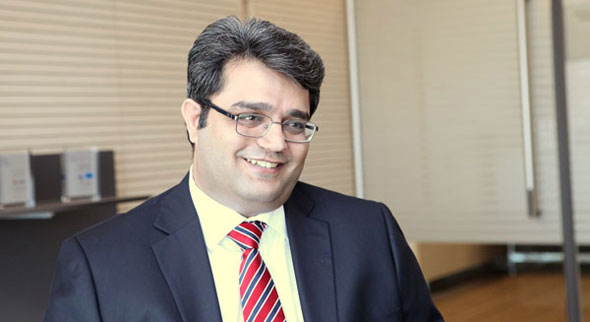
I’ll start with Kuwait’s economy, which is growing at a good rate compared to other emerging markets. According to our estimates, the economy of Kuwait grew at around 6% last year (2011). The Kuwaiti economy in 2012 is expected to record a growth of around 5 – 6%. It is of course highly dependent on oil prices, which YTD has averaged around 110 USD a barrel. This augurs well for the economy of Kuwait, because high oil prices are likely to lead to an indefinite fiscal surplus; it is precisely because of the high oil production levels in Kuwait, caused by the high demand in the US, as well as in emerging markets such as China and India, where the demand is increasing, that the economy has seen this kind of growth. Oil prices this year are expected to be around 100 USD a barrel, which is good for both the economy and the fiscal surplus. I think the breaking oil price for the budget will be in the range of 70 – 80 USD a barrel, although this is not an official figure, and I think that any price above 90 USD a barrel will result in another surplus year for Kuwait. We have now seen around 13 consecutive surplus years in Kuwait.
Public Spending
If we look at spending, most of it is current spending, due to an increase in salaries as well as grants that have been given. However, I think the government of Kuwait is also looking at increasing capital spending, chiefly through mega-projects, as this was highlighted in the Kuwaiti governmental plan. 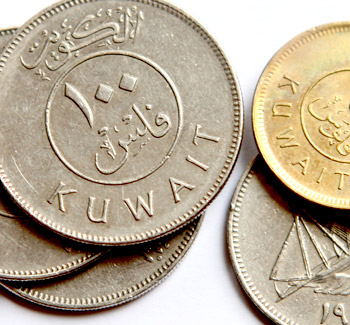 I believe the execution of mega-projects is key and Kuwait will have to implement them quickly in order to facilitate liquidity in the system, which will then have a trickle-down effect.
I believe the execution of mega-projects is key and Kuwait will have to implement them quickly in order to facilitate liquidity in the system, which will then have a trickle-down effect.
Inflation
Kuwait is ranked among the high GDP per capita countries, which gives us a strong spending power. In addition to this, money supply is increasing by about 9 – 10% every year, which is a good rate of growth. Inflation, however, has been in the lower single digits: last year it was around 5%, and we expect it to remain at this level. I think the Central Bank and the governmental authorities have done a good job in containing inflation, so apart from a rise in inflation last month, mainly due to food inflation, we don’t see inflation being much of an issue.
Interest Rates
In terms of interest rates, because Kuwait is backed to a currency basket in which the primary currencies use USD, we feel that our interest rates are likely to follow the US interest rates. As we don’t foresee any major changes in the US interest rates, we feel that ours are also likely to remain stable.
Kuwait Stock Market
As far as the stock market is concerned, last year (2011) was not great for the Kuwaiti stock market or indeed for the whole Middle East region, where we saw a lot of geopolitical movement. As a result, the Kuwaiti stock market witnessed a 20% decline as both institutional and retail investors shied away from the MENA regions and equities in general. That said, things have improved slightly in the first quarter of this year, especially in countries such as Dubai, Saudi Arabia and those in the MENA region, which have shown a growth of more than 15 – 20% this year so far, up to April. In Kuwait, the regional index is more or less flat, but the price index has grown by around 9%, which shows that investors are investing more in the Low Cap and Mid Cap stocks. The smaller stocks have also rallied this year so far, up to April.
Corporate Earnings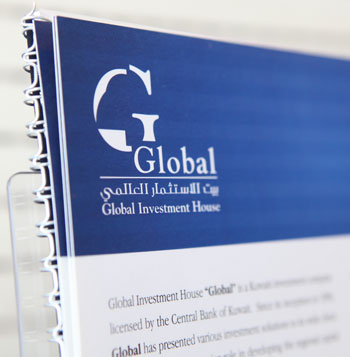
Corporate earnings in Kuwait decreased by around 8% in 2011, which was mainly due to the decline in the earnings of investment companies and real estate companies. Even the bank showed a rather flat-ish growth in its earnings. We are expecting corporate earnings to improve, especially in the investment and real estate sectors, which should lead to more growth in general in 2012.
I’d like to ask you to elaborate on inflation. The world’s central banks have printed staggering amounts of money, which is really unprecedented, yet we are not seeing much inflation. As the Head of Research here, what do you make of it? What is going to happen? Are you worried about the risk attached to inflation?
I think inflation in Kuwait comes from two main sources. One is demand-pull inflation, which has risen slightly over the last two months due to some logistics issues, and the other is the US dollar, because we import a lot of things that are priced in USD.
Obviously, the depreciating dollar has had an effect in terms of imports and inflation, but now that the dollar has become stronger again this is no longer a concern. Rent inflation did not increase significantly last year and overall I think that the monetary policies of the Central Bank and the regulatory authorities will keep inflation under control, at least for this year.
Now let’s look more closely at the different sectors of Kuwait’s economy, for example banking or real estate. Is diversification of the economy occurring, or does everything still basically depend on the economy as a whole? I think last year 95% was dependent on the economy as a whole.
As a percentage of GDP, I think oil still forms the majority of GDP cost trends. It has always stayed above 50% and I think the oil contribution to GDP last year was around 58%. This was partly because of high oil prices and also because production levels out-performed oil GDP growth.
Diversification of the Kuwaiti economy needs to take place.
However, I do think that diversification of the Kuwaiti economy needs to take place; even the government and the regulators are looking at broad-basing the economy by opening up non-oil sectors such as logistics, media, banking and telecom sectors.
This means that more private players are coming into the picture, although I think that oil will still contribute to around 50% of the GDP because it is the commodity on which the economy is based. Governmental and export revenues from oil are just above 90%, so I do not see anything changing over the next year or so. That said, the government is putting initiatives into place to broaden the economy. This is important as it will create jobs, and these are needed because at the moment the public sector is the major job creator in Kuwait, whereas in other emerging markets, or other markets, the private sector is the major job creator.
Broad-basing the economy will lead to diversification, which will create more jobs. This is particularly important for Kuwait, where there is a very young population. Demographics show that there will be a lot of people entering the workforce over the next 15 – 20 years, and we need to create jobs for them. I think the way to do this is to promote the private sector and to diversify the economy so that it can absorb the kind of workforce coming into it. I also think that the growth of SMEs is one of the major growth engines, and I think that the government will be looking at promoting this sector in order to create jobs as well.
Let’s look a bit more at equities and bonds. We have seen the rebound in the bond market in Asia, as well as elsewhere, as people are tending to go for less risk with a more steady return. Are you also experiencing a turn around from equities to bonds?
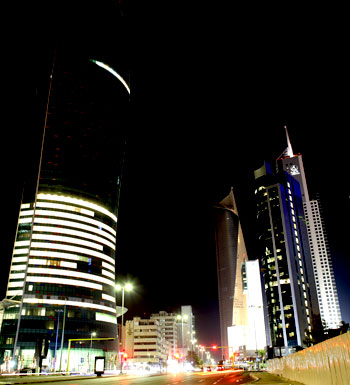
There is a tendency for people to be more risk averse, which is why they are going for fixed-income securities. However, fixed-income securities are not developed in our markets, which is essentially a nascent fixed-income market with a buy-and-hold mentality. There is not much trading activity, so it is not much of a development market. However, there are a lot of options available to investors in equities, and a lot of instruments, so I think there is a high need for developing the bond market. The government could do this by issuing more treasury notes and treasury bonds to give a yield on which the corporates can base their bonds on. Bonds are becoming increasingly popular, including Islamic bonds such as Sukuks, which are being issued by the issuers in the region; the bond market will therefore definitely grow, but it is still in a very nascent stage.
Do you think the outlook for equities this year is more positive or negative?
I think a lot will depend on what is happening in the overall international markets, as well as in the due warranty constitution in the region, which is a very important criterion for any institutional investor investing in the region. Again, opening up the markets and the economy will help in attracting more institutional investors. In terms of equities, Kuwait is creating at around 14 or 15 P/E, which is slightly higher than their GCC counterparts, but I think that once the market improves, earnings will improve.
Some of the stocks in Kuwait are definitely undervalued and there are stocks in the banking and telecoms sectors as well as in industry which have been receiving attention from both retail and institutional investors. This year in particular has seen much more trading activity in stocks, much more than last year, where it was at a multi-year low. Last year showed investors employing more of a risk strategy, but during the first few months of this year there has been a huge increase in trading activity. This shows that investors are looking at entering the stock markets and are looking at the newer positions, which is good for the market and its participants.
Many investors are now turning back to dollars. The real estate bubble in China is bursting, so there is a lot of risk out there. The Brazilian economy is dependent on the Chinese economy, which is dependent on the USA. In Europe we’ve seen what’s happening in Greece, Portugal and Spain. We have seen that gold has been going up for 11 years and now it’s consolidating. There is a lot of uncertainty in the market. Where would you advise investors to put their cash? In your opinion, what is currently undervalued? What are the personal opportunities out there in the world?
First of all, whilst I do think there are opportunities out there in the world, I also think that investors should look at their asset allocation criteria first and give a very hard look at the risk-return trade-off. This will be different for an institutional investor, to a pension fund, to a high-net worth individual, or to a retail investor. Investors should therefore have a thorough understanding of what kind of a risk they are ready to take before looking at the returns. 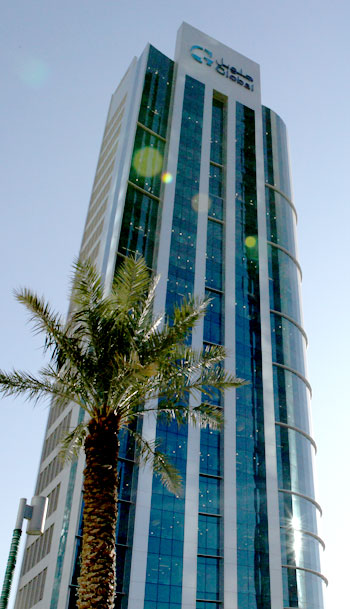 I definitely think the emerging markets are showing high potential because of the kind of growth they are seeing. Despite China’s real estate bubble, we are still looking at an economic growth of 6% to 7%, while India or the South East Asian economies too are expected to record higher growths.
I definitely think the emerging markets are showing high potential because of the kind of growth they are seeing. Despite China’s real estate bubble, we are still looking at an economic growth of 6% to 7%, while India or the South East Asian economies too are expected to record higher growths.
So I think investing in equities or fixed-income instruments in the emerging markets might give a good return. On the other hand, I think the US is coming out very well because the kind of growth and the kind of movement it is seeing in its economy. It has exceeded the economists’ estimates and has recovered more quickly than expected. In Europe, however, there is still a risk of recession, although this risk has become less. This is what makes financial markets interesting: three years ago we were looking at a declining dollar and a stronger euro; now the dollar is recovering and we are wondering if there will even be a euro for much longer.
Overall, I would say that some of the commodities in the emerging markets are definitely worth investing in, because of the insatiable demand that is being generated in the Asian markets. Fixed-income instruments are also a good destination, but then again investors will have to look carefully at their asset allocation.
Could you perhaps add something about the banking sector to these comments?
We saw an asset growth and a deposit growth of around 7 – 8% in the banking sector last year, although loan growth did not increase as sharply. In 2012, I think we might see a flat-ish top line, but an improved bottom line because the banks are taking fewer provisions and write-downs than in previous years. If there is an increase in provisions this year it could affect the bottom line, but overall I think provisioning levels are being taken care of as the banking sector is very well capitalised and in good shape generally. The demand in cross-structure spending could affect this, as could consumer financing, which will interfere with the lending activity in Kuwait.
If you think about it, there are limited opportunities in Kuwait for lending and banks are tantalising each other, each trying to prove that they are the best, and there are both winners and losers in this competition.
That’s true, but what I think is positive is that because of the GCC economic union and the MENA integration, Kuwaiti banks are going outside Kuwait. NBK, for example, is present in other countries in the MENA region, and KFH is present in Malaysia and Turkey. Most of the banks are now opening up branches in other GCC countries, simply because as a part of the GCC economic union this is now possible. This will definitely benefit Kuwaiti banks because they will have a larger economic area to cater to, and as they grab market share in other countries, their growth will also increase. Kuwait will still remain their primary market, but entering promising markets such as Malaysia, Turkey and Egypt will facilitate their growth and increase their geographic presence in the MENA region and the rest of the world.
Now let’s just touch on the CMA. Kuwait implemented the CMA earlier this year. What do you make of it?
I think the Capital Markets Authority is definitely a step in the right direction, and it was very much needed, but I think it is also still in the initial stages and is looking at all the various legal aspects: bye-laws, different aspects of investments, listed securities, and other sectors. We are still waiting to see which statutes the CMA will impose and what kind of growth that will cause. They are looking towards homogenising and developing the structure for investment banks and listed companies, which is exactly what was needed.
As you know, the structure in Kuwait is such that there are investment companies that demand other investment companies that demand whole administrative structures. Transparency will help, at least for outside investors, who are aware of these things but may not know much about them.
Yes, definitely. For institutional investors transparency is key to entering a particular market. In Kuwait we do have some corporates and investment banks that are less transparent in following the best practices of international companies and investment banks, so I think this will encourage investors to see Kuwait as an investment destination. A very important point is that the government is also addressing the issue: if you look at His Highness the Amir’s vision, it is to develop Kuwait as a commercial and financial centre, so I think that all our efforts are being focused in this direction, and I hope and am sure that they will yield results in the future.